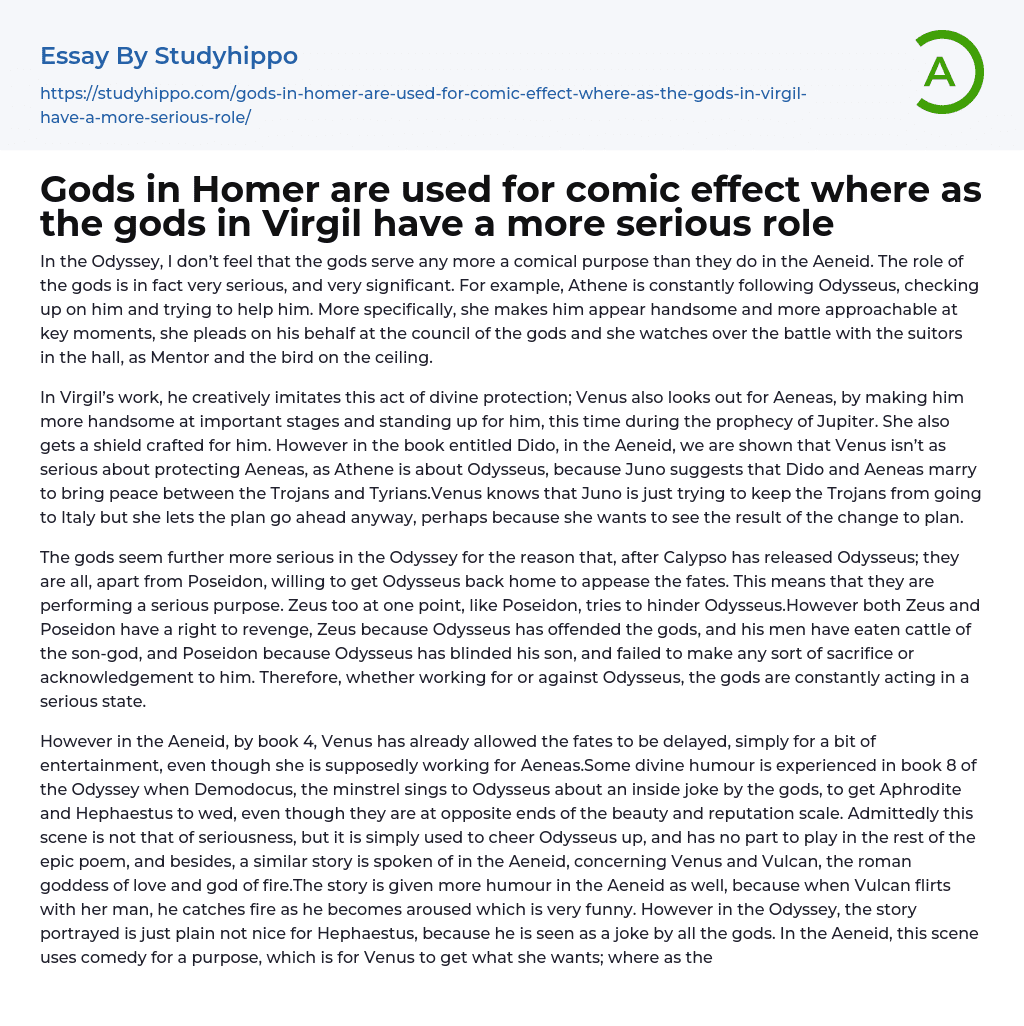Despite the presence of comical elements in the portrayal of the gods in the Aeneid and the Odyssey, their role is actually quite significant. In the Odyssey, Athene continually assists Odysseus by keeping a watchful eye on him, enhancing his appearance at crucial times, interceding on his behalf at council meetings, and overseeing the battle against the suitors with her presence as Mentor and a bird on the ceiling.
In Virgil's Aeneid, Venus acts as a divine protector of Aeneas. She enhances his appearance during important stages and defends him during Jupiter's prophecy. She even has a shield made for him. However, in the book Dido, it becomes clear that Venus is not as committed to protecting Aeneas as Athena is to protecting Odysseus. Juno suggests that Aeneas and Dido marry to create peace between the Tro
...jans and Tyrians, but Venus allows the plan to proceed despite knowing Juno's ulterior motive of preventing the Trojans from reaching Italy. This may be because she wants to see what result this change of plan will bring about.
The seriousness of the gods in the Odyssey is evident as they all, except for Poseidon, are willing to help Odysseus return home after being released by Calypso. This shows that they have a serious purpose. Although Zeus and Poseidon both try to hinder Odysseus, they have the right to do so. Zeus is offended by Odysseus' actions as he has eaten the cattle of the son-god, and Poseidon seeks revenge as Odysseus has blinded his son and failed to make any sacrifice or acknowledgement. Regardless of whether they are helping or hindering Odysseus, the gods always act in a serious manner.
By
book 4 of the Aeneid, Venus has already delayed the fates for entertainment purposes despite working for Aeneas. In book 8 of the Odyssey, Demodocus sings a humorous song about an inside joke among the gods to get Aphrodite and Hephaestus married. Though not a serious scene, it serves to cheer up Odysseus and does not affect the rest of the poem. Similarly, the Aeneid mentions a story about Venus and Vulcan, with added humor as Vulcan catches fire while flirting with her. The Odyssey's version portrays Hephaestus as a joke among the gods, while in the Aeneid, comedy is used purposefully by Venus to achieve her desired outcome.
Compared to the gods in the Odyssey who only intervene when mortals need them to, the gods in the Aeneid are more serious and focused on their own goals. Juno, in particular, works manipulatively to slow Aeneas down for personal gain, while Poseidon's efforts to slow Odysseus down were punitive. As a result, the Aeneid gods are viewed as more serious because they intervene when immortals want to. Juno plays a significant role in this reputation as she works to hinder Aeneas' progress, using Aeolus to send a storm and delaying him in Carthage, in addition to dispatching Allecto to incite war in Italy. Ultimately her intention is to prevent the Trojans from forming Rome and destroying Carthage.
Comparing the portrayal of gods in Aeneid and Odyssey reveals a difference in their seriousness. While Juno and Venus are depicted as working for their own personal gain, Poseidon and Zeus only interfere when they feel they have been wronged. In terms of comedy, while there are fewer such
scenes involving gods in the Odyssey, they do not seem to serve a purpose. In the Aeneid, however, comedic scenes involving gods have a structure and serve a purpose. For example, when Venus flirts with her husband and he catches fire, the comedy serves to highlight her motive. Both poems convey the serious purpose of the gods but in the Aeneid, it is accompanied by light-heartedness. In contrast, the gods in Odyssey are not portrayed for mere comic effect.
Despite performing less serious acts than the immortals in the Aeneid, all the characters in the Odyssey play a role in either hindering or helping Odysseus. Therefore, I do not think that they are just used for comic effect.
- Aeneid essays
- Beowulf essays
- Blackberry Picking essays
- Canterbury Tales essays
- Dulce Et Decorum Est essays
- My Last Duchess essays
- Odyssey essays
- Sir Gawain And The Green Knight essays
- The Road essays
- Aldous Huxley essays
- Alice Walker essays
- Amy tan essays
- Anne Bradstreet essays
- Anton Chekhov essays
- Arthur Miller essays
- Augustine essays
- Bertolt Brecht essays
- Booker T Washington essays
- Carol ann duffy essays
- Charles Dickens essays
- Charlotte Perkins Gilman essays
- Chinua Achebe essays
- Christina Rossetti essays
- Consider The Lobster essays
- Edgar Allan Poe essays
- Elizabeth Bishop essays
- Emily Dickinson essays
- Ernest Hemingway essays
- F. Scott Fitzgerald essays
- George Orwell essays
- Harper Lee essays
- Homer essays
- James Baldwin essays
- Jane Austen essays
- John Donne essays
- John Steinbeck essays
- Kate Chopin essays
- Kurt Vonnegut essays
- Langston Hughes essays
- Leonardo Da Vinci essays
- Mark Twain essays
- Mary Shelley essays
- Maya Angelou essays
- Nathaniel Hawthorne essays
- Oscar Wilde essays
- Percy Bysshe Shelley essays
- Peter Skrzynecki essays
- Phillis Wheatley essays
- Poets essays
- Ralph Waldo Emerson essays




